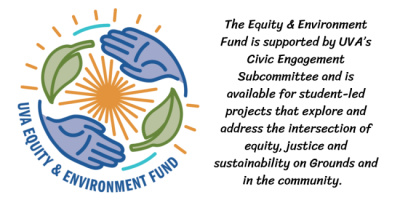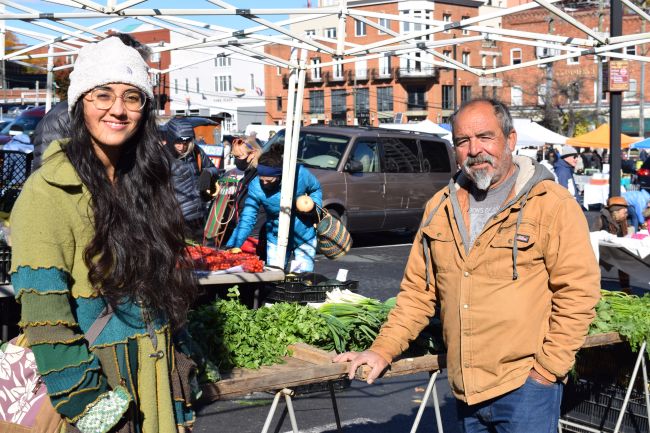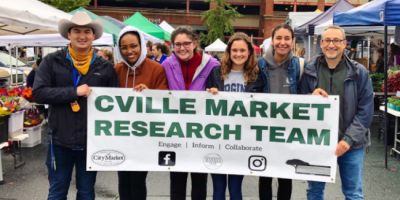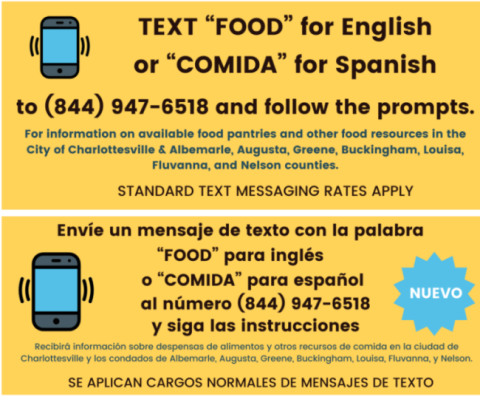
Food insecurity is the lack of affordable fresh produce and other farm products, often in lower-income neighborhoods. UVA students are tackling the issue from many angles.
Meet Jennifer. She lives in the City of Charlottesville. She's white, 37, has a graduate degree and earns between $100,000 and $150,000. She attends the city's downtown Farmers Market regularly.
Jennifer is not a real person, but a composite of the average market customer based on a UVA student-led survey in 2018 through the Equity & Environment Fund, which provides grants to student projects that connect issues of social equity and environmental sustainability.
Now meet Janet. She may be Black, or Latinx, earning $52,000 (the city's median income) or less. She might be struggling with high-blood pressure or diabetes. For her, having fresh fruits and vegetables could be an important health improvement, but she may not feel a sense of inclusion at the Farmers Market, either financially or socially.
"The Charlottesville food system is very inequitable in its access to fresh, nutritious, affordable foods. It clearly has disparities along racial and class lines due to historic injustice," says Gabby Levet, Food Equity Policy Advocate and Organizer with Cultivate Charlottesville.
As a 4th-year UVA student in 2018, Levet was part of the team that conducted the survey. She had been inspired by a course on food politics with Prof. Paul Freedman, an expert on local food systems. The managers of the Farmers Market had sought his help on doing a survey to determine who their customers were.
"If there's one thing we know about supermarkets, they're tracking everything," Freedman says. "It's an incredible data factory. But farmers markets don't even know how many people come to the market on any given day, unless data is collected in an effective, organized fashion."
Farmers Market survey results
Levet, along with students Emma Feinman and Allie Arnold, wrote an interim report that May, noting their data were sparse because the summer season hadn’t begun. With all three graduating that month, the project might have languished, but the team received an E&E Fund award of $2,000 to support four UVA fellows to expand and implement the survey over the next several months. The final presentation was delivered that fall.
“As faculty, we see a lot of student efforts that are fantastic but then they’re over when the leaders graduate. The Equity & Environment Fund allowed this research team to carry on, and that’s why it was critical,” Freedman says.
The survey was a key part of the city’s overall strategic planning for the Farmers Market, says market manager Justin McKenzie. In addition to understanding who existing customers were, "it enabled us to see where we may be lacking and how best to reach out to those we're not reaching."
Of note, they found very few people who use SNAP benefits, the USDA Supplement Nutrition Assistance Program. McKenzie says the city began advertising that the market accepts SNAP tokens and in 2019, saw an increase in use. In addition, more vendors began using compostable foodware due, McKenzie thinks, to simply being asked questions about their composting practices.
In the long-term, the survey provides a benchmark of data that McKenzie hopes to repeat every five years to understand trends. "The students were very motivated and a lot of fun to work with."
Furthering food justice
Also in 2018, Levet and other students received an additional $5,000 from the E&E Fund for a different project -- forging a partnership between the Morven Food Lab, City Schoolyard Garden, Charlottesville Food Justice Network and UVA's Office for Sustainability to pursue research and collaboration around the issue of food justice in the community. The funding went to two UVA fellowships to support community engagement and advocacy, and to directly support the Food Justice Network's research and role in the partnership.
"That represents a sea change in the relationship between the university and Charlottesville," Freedman says, adding that too often, UVA's community projects are one-way, with researchers coming in and getting data, experience and course credit, but not returning benefit to the community. "That feels a little extractive. Something as basic as funding for organizations is important recognition that we are, and should be, partners. And one thing they need is money."
Responding to residents’ needs
After Levet graduated from UVA, she went on to manage farmers markets in Richmond, then returned to Charlottesville to join Cultivate Charlottesville in early 2020. The organization was partnering with other nonprofits to provide emergency food and other resources as the Covid pandemic took hold, and heard feedback from residents who were having trouble navigating the myriad food resources.
In her role at Cultivate, Levet supported applications for two more student-led E&E Fund grants, totaling almost $9,000, to develop and launch the Food Security Text Program to provide real-time information about when and where free food would be available to community members in need. The funding supported two UVA students who spearheaded the program, as well as costs associated with the underlying technology.
Levet's experience with the E&E Fund, both as a UVA student and as a nonprofit staffer, is an excellent example of the potentially fertile intersection for the University and community organizations to collaborate on food justice solutions and other environmental justice issues.
-- By Cat McCue, Communications Generalist, UVA Office for Sustainability




